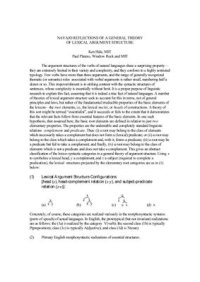
Ebook: Navajo Reflexions of a General Theory of Lexical Argument Structure
Author: Hale Ken.
- Genre: Linguistics // Foreign
- Tags: Языки и языкознание, Языки индейцев, Навахо
- Language: Indigenous-English
- pdf
Paul Platero, Window Rock and MIT; — 11 с.The argument structures of the verbs of natural languages share a surprising property — they are extremely limited in their variety and complexity, and they conform to a highly restricted typology. Few verbs have more than three arguments, and the range of generally recognized thematic (or semantic) roles associated with verbal arguments is rather small, numbering half a dozen or so. This impoverishment is in striking contrast with the syntactic structures of sentences, whose complexity is essentially without limit. It is a proper purpose of linguistic research to explain this fact, assuming that it is indeed a true fact of natural languages. A number of theories of lexical argument structure seek to account for this in terms, not of general principles and laws, but rather of the fundamental irreducible properties of the basic elements of the lexicon—the root elements, i.e., the lexical nuclei, or heads of constructions. A theory of this sort might be termed essentialist, and it succeeds or fails to the extent that it demonstrates that the relevant facts follow from essential features of the basic elements. In one such
hypothesis, that assumed here, the basic root elements are defined in relation to just two
elementary properties.
hypothesis, that assumed here, the basic root elements are defined in relation to just two
elementary properties.
Download the book Navajo Reflexions of a General Theory of Lexical Argument Structure for free or read online
Continue reading on any device:

Last viewed books
Related books
{related-news}
Comments (0)